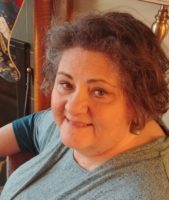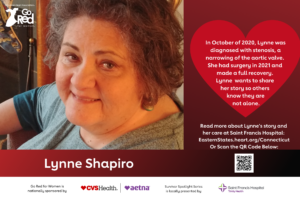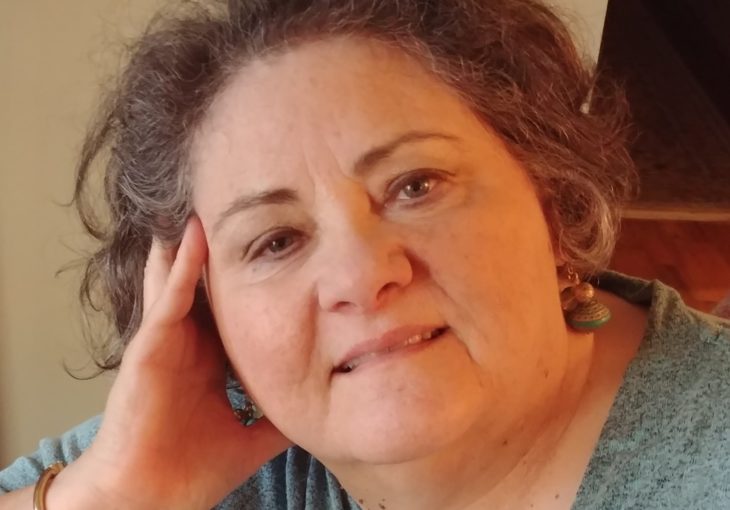This Survivor Spotlight is presented by Saint Francis Hospital – a member of Trinity Health of New England
When asked to share my “survivor story” frankly, it took me by surprise as I don’t think of myself as a survivor. At least this definition of survivor: a person remaining alive after an event in which others could have died. I underwent a heart procedure never acknowledging to myself that I might have complications and not survive.
However, as I reflect on my journey, the definition of a survivor I choose for myself is that of a person who endures adversity or hardship with persistence. In other words, a hard nut, a tough cookie, or a trooper. My procedure went well, yet there were some rough parts surrounding other complications and circumstances that caused my journey to get complicated.
My story begins when I did not admit to my cardiologist for several months my slowed ability to breathe as I confused it with my asthma. When asked if I could walk across the parking lot without being short of breath, I muttered a nonresponse. My lack of reply resulted in an ECHO in August of 2020.

The ECHO results showed a narrowing of the aortic valve. I did not grasp the seriousness of what this meant and even ignored the seriousness of the meaning. A heart catherization was scheduled for October 2020. The procedure indicated stenosis of the valve at around 75 percent. I recall my doctor saying to me in the operating room, “You need to get this fixed right away,” and my question back to him was, “Are you sure it needs to be done soon?” Again, not admitting to myself that I had something wrong with me. He did share some good news that the other valves were fine.
While recovering from the catherization, another physician came to the room to discuss open heart surgery with me and my husband. The thought of open heart surgery is very scary. I kept telling myself, these are talented doctors, and they do this surgery all the time. But at the same time, I recalled my dad having a similar value issue. In 2018, he had
Transcatheter Aortic Valve Replacement (TAVR) at a hospital in North Carolina where he lives. The idea of not being cut open and having a long recovery was very appealing to me but I did not know if I would qualify for the procedure.
TAVR is a minimally invasive procedure where a new valve is inserted without removing the old, damaged valve. The new valve is placed inside the diseased valve.
While leaving the hospital after the catherization, the nurse reviewed with me how to clean myself with the special soap and wipes for when I had the open-heart surgery as she sa
id that I would be back on this floor for recovery. Though, that was very nice of her, I was thinking to myself, “Why is she telling me this information? I don’t need heart surgery.” Again, denial of the seriousness of my heart’s condition. I really didn’t feel bad if I sat still and did not walk around and besides, open heart surgery would be very disruptive to my life.
In early November, I met with the TAVR coordination team to schedule all the tests that were required to validate if I met all the TAVR qualifications. After a day of tests at the hospital, my husband and I met with the surgeon. He explained the procedure in more detail and that he would take it to the Heart Valve Recommendation Committee to seek approval.
Though not outwardly stated, I felt that the committee’s hesitation to approve TAVR versus open heart surgery was my age. TAVR is mostly used on older people that would not undergo open heart surgery. The good news here is that my age of early 60’s was considered young.
I didn’t talk about my need for a new heart valve with friends or family though it was often on my mind. I felt imperfect and had emotional prohibitions which impacted my ability to share. I received approval in early December and the TAVR was scheduled for January 5.
By the end of December, I started with symptoms such as palpitations, edema, dizziness, and shortness of breath. My condition worsened very quickly. At this time, I did have to mention it to my work and some of my family members. It was difficult for me to share as I was feeling helpless and overwhelmed.
I went to the hospital after the new year, and it was determined that I was running a temperature which pushed my TAVR another week until fever subsided. My time in the hospital was at the height of COVID so I was not able to have family or outside visitors in my room. This week prior to the procedure was the toughest time for me on my heart valve replacement journey. I was not feeling healthy, and I was alone. The nurses took good care of my health issues, but it was all the other things about being in the hospital that caused me to struggle. It was then that I recognized that the glass of water was left over by the table in the front of the room not on my bedside table. It was then that I realized what a messy sleeper I am and that the covers and pillows always end up on the floor. It was so exacerbating not to have family members available to assist in these mundane items.
Not feeling well and at the height of frustration, I called crying to my nursing team, who came right away to see me. They each had a gift of making me feel calm and not alone and a way of making me feel special. And to top it off, my physician made himself available to visit me a couple times as well. They enabled me to hang tough during some very rough times prior to my procedure.
Finally, I was cleared with no fever and able to have the TAVR on January 12, 2021. I still had to get clean with the special soap and wipes and prepare for anesthesia. I recall going into the operating room and then waking up hours later with my surgeon saying it was successful. It’s amazing how in a matter of hours your health circumstances can change for the better. The hospitalization was for two nights and discharge was January 14.
Prior to release, I engaged with Home Health services that scheduled Physical Therapy, Occupational Therapy, and visiting nurses to come to my house. It surprised me how much energy I didn’t have after the procedure. I could not understand why I needed all these services but once I got home, I recognized that even though the procedure seemed simple (as compared to open heart surgery), it was impactful to my body. I had to gain strength and work on adjusting my blood pressure medications as my heart adjusted to the new valve.
I was making good progress for a couple days and then my blood pressure went incredibly low which resulted in me being admitted into the hospital for another couple days. My heart valve was fine and though this was a distressing situation, I knew my body would adapt.
Back home I continued the home health services for 4-6 weeks. Since I work in an information technology role, I was able to develop a workable plan of returning to my position remotely at Travelers after two weeks while continuing my home health services.
My way of handling this journey was to think of myself as a trooper and not let complications get in my way of making a full recovery. Now one year later, my ECHO and other tests results indicate that the new valve (Cow Valve) is working as expected and I feel good!

This Survivor Spotlight poster featuring Lynne will be on display at the 2022 Greater Hartford Go Red For Women Luncheon!
